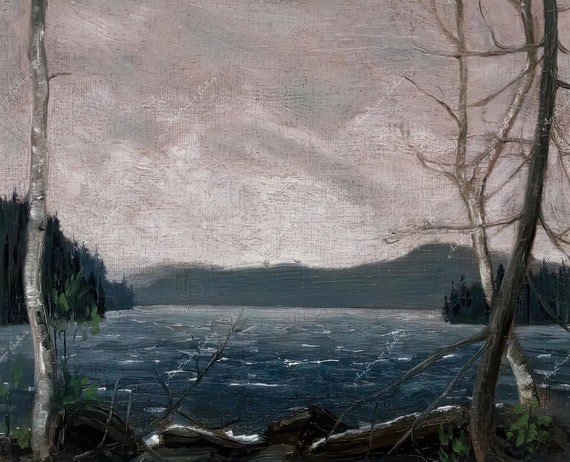Thomson, Northern Lake, Spring, 1912
CHAPTER TWO
In the morning the camp was astir before the sun. There had been a light fall of snow during the night and the air was sharp. Punk had done his duty betimes, for the odors of coffee and fried bacon reached every tent. All were in good spirits.
"Wind's shifted!" cried Hank vigorously, watching Simpson and his guide already loading the small canoe. "It's across the lake—dead right for you fellers. And the snow'll make bully trails! If there's any moose mussing around up thar, they'll not get so much as a tail-end scent of you with the wind as it is. Good luck, Monsieur Défago!" he added, facetiously giving the name its French pronunciation for once, "bonne chance!"
Défago returned the good wishes, apparently in the best of spirits, the silent mood gone. Before eight o'clock old Punk had the camp to himself, Cathcart and Hank were far along the trail that led westwards, while the canoe that carried Défago and Simpson, with silk tent and grub for two days, was already a dark speck bobbing on the bosom of the lake, going due east.
The wintry sharpness of the air was tempered now by a sun that topped the wooded ridges and blazed with a luxurious warmth upon the world of lake and forest below; loons flew skimming through the sparkling spray that the wind lifted; divers shook their dripping heads to the sun and popped smartly out of sight again; and as far as eye could reach rose the leagues of endless, crowding Bush, desolate in its lonely sweep and grandeur, untrodden by foot of man, and stretching its mighty and unbroken carpet right up to the frozen shores of Hudson Bay.
Simpson, who saw it all for the first time as he paddled hard in the bows of the dancing canoe, was enchanted by its austere beauty. His heart drank in the sense of freedom and great spaces just as his lungs drank in the cool and perfumed wind. Behind him in the stern seat, singing fragments of his native chanties, Défago steered the craft of birch bark like a thing of life, answering cheerfully all his companion's questions. Both were gay and light-hearted. On such occasions men lose the superficial, worldly distinctions; they become human beings working together for a common end. Simpson, the employer, and Défago the employed, among these primitive forces, were simply—two men, the "guider" and the "guided." Superior knowledge, of course, assumed control, and the younger man fell without a second thought into the quasi-subordinate position. He never dreamed of objecting when Défago dropped the "Mr.," and addressed him as "Say, Simpson," or "Simpson, boss," which was invariably the case before they reached the farther shore after a stiff paddle of twelve miles against a head wind. He only laughed, and liked it; then ceased to notice it at all.
For this "divinity student" was a young man of parts and character, though as yet, of course, untraveled; and on this trip—the first time he had seen any country but his own and little Switzerland—the huge scale of things somewhat bewildered him. It was one thing, he realized, to hear about primeval forests, but quite another to see them. While to dwell in them and seek acquaintance with their wild life was, again, an initiation that no intelligent man could undergo without a certain shifting of personal values hitherto held for permanent and sacred.
Simpson knew the first faint indication of this emotion when he held the new .303 rifle in his hands and looked along its pair of faultless, gleaming barrels. The three days' journey to their headquarters, by lake and portage, had carried the process a stage farther. And now that he was about to plunge beyond even the fringe of wilderness where they were camped into the virgin heart of uninhabited regions as vast as Europe itself, the true nature of the situation stole upon him with an effect of delight and awe that his imagination was fully capable of appreciating. It was himself and Défago against a multitude—at least, against a Titan!
The bleak splendors of these remote and lonely forests rather overwhelmed him with the sense of his own littleness. That stern quality of the tangled backwoods which can only be described as merciless and terrible, rose out of these far blue woods swimming upon the horizon, and revealed itself. He understood the silent warning.
Algernon Blackwood, from "The Wendigo"

No comments:
Post a Comment